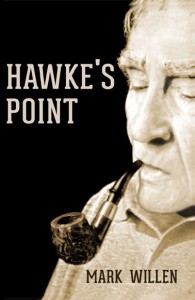The Book Club Meeting I’ll Never Forget
11/7/14 — THE BOOK CLUB MEETING I’ll NEVER FORGET
I’ve been to a lot of book club meetings in my day, but never one quite like this, never one where the stakes were so high. This wasn’t going to be a casual conversation about books with a group of friends; this was going to be a conversation with eight strangers about a book that meant everything to me: Hawke’s Point, my debut novel published last summer. Was I nervous? You bet.
As soon as everyone arrived and we’d all been introduced, I tried to break the ice by urging them to be honest, assuring them that after years in writers’ critique groups, I was used to criticism and had developed a pretty thick skin. They readily agreed to be candid—so readily, in fact, that I wondered what I’d gotten myself into. But my mention of critique groups aroused their interest, and before we got into my book, they wanted to know more about the writing process and an author’s need for feedback. They asked lots of good questions about how it all worked, and that allowed me to relax as we got to know each other over a neutral topic. The wine didn’t hurt, either.
 But soon we were talking seriously about Hawke’s Point. Initially, the comments were positive as they told me what they liked about the book. Character development is my strength, and I was pleased to hear the compliments about how real and complex my characters were, especially Jonas, the protagonist. Then came the first note of discord. One participant said she was annoyed to no end by Mary Louise, the call girl who plays a key role in the novel’s major conflict. She’s so sure she’s right and I didn’t understand why, the participant said. But someone else said that was one of the things she liked about Mary Louise, her conviction and determination.
But soon we were talking seriously about Hawke’s Point. Initially, the comments were positive as they told me what they liked about the book. Character development is my strength, and I was pleased to hear the compliments about how real and complex my characters were, especially Jonas, the protagonist. Then came the first note of discord. One participant said she was annoyed to no end by Mary Louise, the call girl who plays a key role in the novel’s major conflict. She’s so sure she’s right and I didn’t understand why, the participant said. But someone else said that was one of the things she liked about Mary Louise, her conviction and determination.
I listened without rushing in. In the weeks since the novel came out, nothing has surprised me more than the intensity and controversy surrounding Mary Louise. Many readers are fascinated by her, attracted and repelled simultaneously by her chosen line of work, and eager to understand why she does it. Some readers have suggested I make her the central figure in a sequel, and one reviewer named her as a favorite character. But she’s also drawn scorn. Another reviewer strongly objected to her and accused me of glorifying prostitution.
I was gratified to hear some of the book club members compliment the writing style of the novel as clean and smoothly paced, even while dealing with complex ethical issues. One reader said there were no parts to skip, as big a compliment as I could hope for. But one woman complained that my interior dialogues all sounded alike, no matter which character’s head I was in. Their speech was distinct, she said, but not their thoughts. That was interesting and something I’ll work on in the future.
I was caught short one other time. Someone asked me why a character had behaved in a certain way at a certain time, and I didn’t have an answer. If I’d really known the character the way I should, I would have had an answer for that question.
We continued talking about the book over a casual dinner and at one point it hit me that we were talking about imaginary characters—characters that I’d created—as though they were real and as though their problems were real. As they dug deeper for meaning in the novel, I was delighted to see some of them find significance in ways that had never occurred to me. While they seemed to assume that I had a sound reason and a specific intention for every decision I’d made in writing the novel, I knew better. At first I thought that was a flaw—that I should have had a reason for every word I chose, for every action by every character. But then I realized that this wasn’t so much a failure as a different kind of success. I had made the characters real enough for each reader to interact with them on their own footing. It was an important reminder that what readers bring to a book is as important as what authors leave behind.
When I left after three hours, I was immensely gratified. The eight participants had all read the book closely and had found a lot to think about and discuss. Most important, they all seemed to “get the book.” It had been read and understood largely in the way I intended, and it had prompted debate about issues I thought were worth debating. As an author, I couldn’t have wished for anything more.
Mark Willen
Mark Willen’s novels, Hawke’s Point, Hawke’s Return, and Hawke’s Discovery, were released by Pen-L Publishing. His short stories have appeared in Corner Club Press, The Rusty Nail. and The Boiler Review. Mark is currently working on his second novel, a thriller set in a fictional town in central Maryland. Mark also writes a blog on practical, everyday ethics, Talking Ethics.com.
- Web |
- More Posts(48)